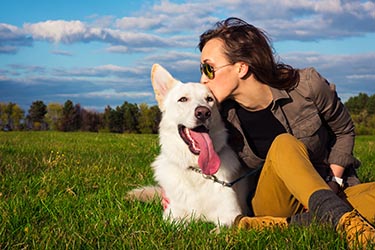Motivating Clients to Keep Pet Vaccinations Current

As animals continue to be more socially involved in our lives, the need for a proper vaccination regimen becomes more important. Holding discussions with clients of the health issues that relate to the vaccination of pets is critical. Veterinary staff that understand and can relay vaccination information will instill confidence in their clients.
How Does Vaccinating Help Establish Immunity?Natural Exposure to Disease and Active Immunity
- A healthy immune system of an animal that becomes ill with an infectious disease creates natural antibodies that give it active immunity to protect itself against that disease.
- The type of active immunity gained by natural exposure often lasts for life.
Vaccination Induced Active Immunity
- Vaccinations induce immunity by stimulating the production of antibodies, which then attack and destroy the pathogens in an effort to protect itself against that disease.
- Unlike active immunity gained through natural exposure, the duration of the protection offered with a vaccination can be limited and will require booster vaccines.
Common reasons why vaccinating is not always successful:
- An animal is so malnourished it is not physically capable of creating antibodies to build immunity.
- An animal that is on immunosuppressive drugs that prevent it from making antibodies.
- Newborn animals that still carry the maternal antibodies that interfere with the vaccine antigen that prevent it from stimulating the immune system.
Modified Live Virus (MLV)
- Live virus vaccines that are modified to replicate, but not cause the actual disease
- Work to quickly generate full immune response
Inactivated or Killed Virus
- Dead virus vaccines that do not replicate and cannot cause the disease
- Work to stimulate the immune response
Recombinant Vaccines
- Newest in technology, currently in experimental animal use
- Uses spliced DNA fragments to stimulate antibody production
- Vaccines deliver specific antigen material
- Possible reduction in the risk of vaccination reactions
Core Vaccines
- Recommended for every pet
- Dogs
- Rabies
- Canine Distemper
- Canine Parvovirus
- Canine Adenovirus 2
- Cats
- Rabies
- Panleukopenia (FPV)
- Feline Herpesvirus (FHV)
- Feline Calicivirus (FCV)
- Feline Leukemia Virus (FeLV) for cats <1 year of age
Non-Core Vaccines
- Vaccinations necessary only for certain animals
- Consideration for use dependent on lifestyle and geographic location
- Dogs
- Examples: Leptospirosis, Lyme Disease
- Cats
- Example: Feline Leukemia Virus
Injectable Vaccines
- Intramuscular – Vaccine is injected into the muscle
- Subcutaneous – Vaccine is injected under the skin
Intranasal
- Method used for vaccines that protect against respiratory diseases
- Drops of vaccines are inserted into the nose
Preventative Care
- To fight diseases carried by unvaccinated companion animals, such as canine parvovirus or feline distemper
- To ward off diseases carried by wildlife, such as rabies or Lyme Disease
Newborns
- Newborns receive antibody protection from their mother, but they are not immune to disease
- If mother was not exposed to a disease, or if she did not receive the vaccination against the disease, her babies will not receive maternal antibody protection, and they will be susceptible to infection
There are recommendation guidelines for all vaccinations that should be customized for individual animals.
- Some states regulate the administration of certain vaccines, for example rabies
- Certain vaccinations can be given to pets as young as six weeks of age
- Some vaccinations recommend following a booster vaccine guideline schedule for all dogs and cats
- This schedule should be discussed with the veterinarian because they may vary per animal, and they are dependent upon:
- Animal’s immune response
- Type of vaccination used
- Antigen used
- Number of exposures to the pathogen
Vaccination use has been shown to be widely successful in the reduction of many animal health diseases. Providing the information can help clients make the important decision that vaccinating is a practice that should be followed to maintain their pet’s well-being. Along with providing information, an additional approach to motivate clients would be to support their busy schedules by holding a vaccination clinic. Need more tips on vaccinations? Contact your representative today at 855-724-3461.
Need Regulatory Assistance
If you need help with regulatory or licensing issues, we're happy to help. We have a wide variety of resources to help you when issues arise.

Careers
Are you looking for a place to let your talents shine? At Covetrus, we help our practitioner customers better serve their patients and take pride in providing the best customer experience possible. Search our open positions to see our available opportunities.
Newsletter
Stay current with what’s going on with Covetrus, subscribe to receive our newsletter and email communications. Subscribers will receive the latest information in practice management, sales and marketing, animal health, and more.


Leave a comment